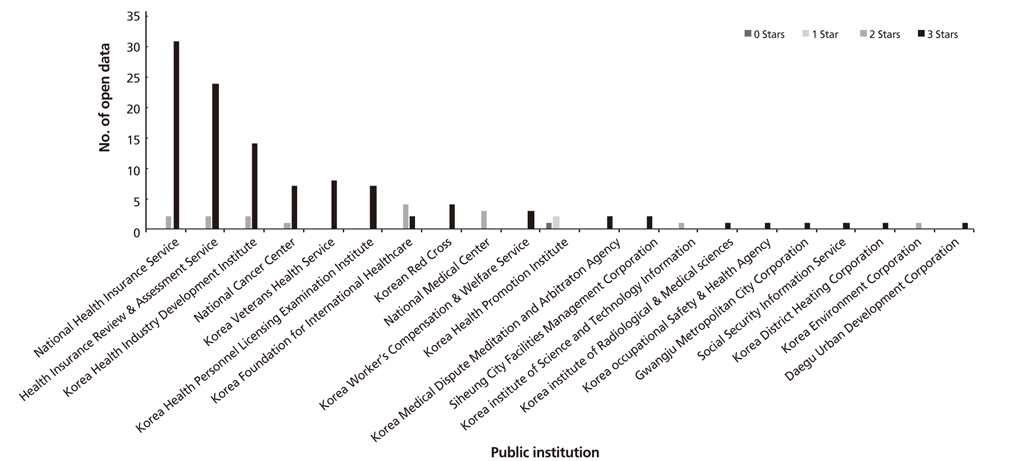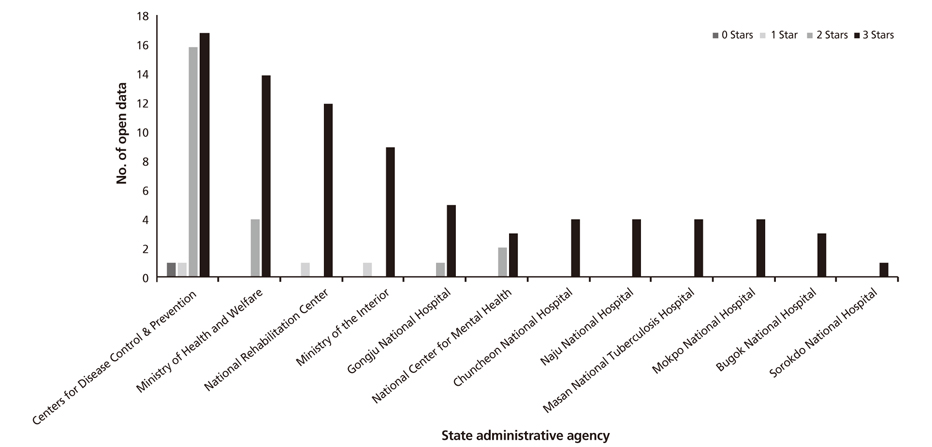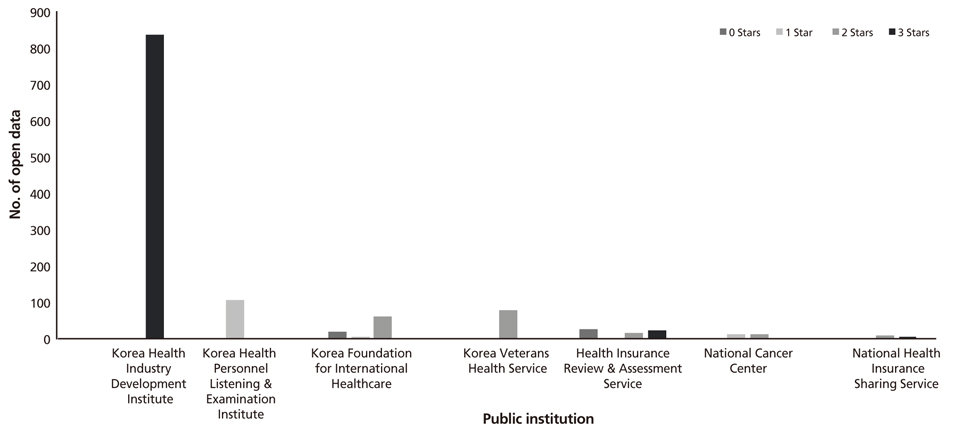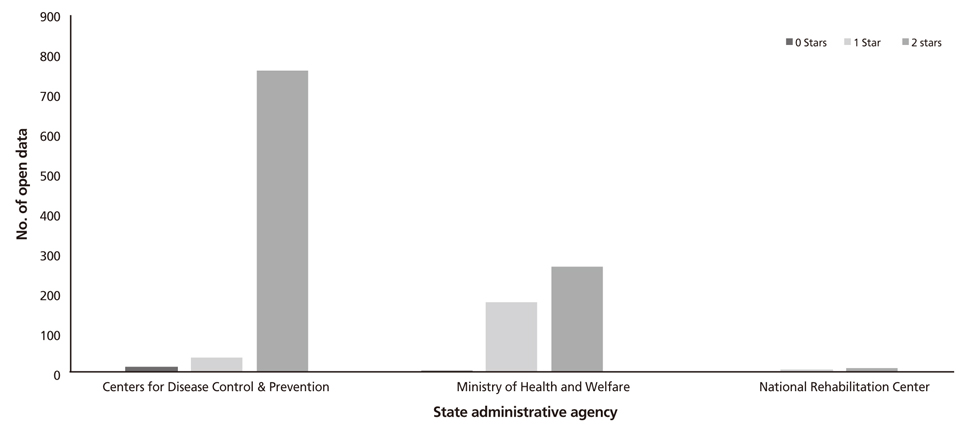J Korean Med Assoc.
2017 Jun;60(6):506-513. 10.5124/jkma.2017.60.6.506.
Status and compliance with standard open format of public open data in healthcare in Korea
- Affiliations
-
- 1Department of Business Data Convergence, Chungbuk National University, Cheongju, Korea.
- 2Department of Information Industry Engineering, Chungbuk National University, Cheongju, Korea.
- 3Department of Health Informatics and Management, College of Medicine, Chungbuk National University, Cheongju, Korea.
- 4Department of Management Information Systems, College of Business, Chungbuk National University, Cheongju, Korea. wscho@chungbuk.ac.kr
- KMID: 2384397
- DOI: http://doi.org/10.5124/jkma.2017.60.6.506
Abstract
- In the era of government 3.0, the availability of open government-owned public data and data sharing with the private sector are important. We surveyed the status of public data openness in the healthcare domain and of compliance with the standard open data format based on the "5 stars of linked data" model. We examined healthcare data on the Open Data Portal (https://www.data.go.kr). We also surveyed data on the websites of the public institutions and state administrative agencies that provided healthcare data on the Portal. In terms of data on the Portal, all public institutions except the National Medical Center, the Korea Institute of Science and Technology Information, and the Korea Environment Corporation were found to have provided data in the 3-stars format corresponding to the Public Data Open Standard Maintenance Guide. All data provided by state administrative agencies met the 3-stars format. Only 2 institutions (the Health Insurance Review & Assessment Service and the Korea Health Industry Development Institute) released data in the 3-stars format on their websites. Among the major state administrative agencies providing data on the Portal, none released data in the 3-stars format on their websites. Government-owned data should be provided in a standard format both on the Open Data Portal and on data-holders' websites to facilitate communication and collaboration. Considering the huge potential of linked healthcare data from a single national health insurance system, providing open data in compliance with the standard open format will promote the opening and sharing of public data.
Keyword
MeSH Terms
Figure
Reference
-
1. Yi HJ, Nam YJ. A study on revitalizing the use of Korean public data: focused on linked open data strategy. J Korean Soc Inf Manag. 2014; 31:249–266.
Article2. Kwon SA, Baek SH, Lee JY. Current domestic public open data status and case analysis. Proc Korea Soc Inf Manag. 2015; 8:37–45.3. Open Data Strategy Council. Open data [Internet]. Seoul: Open Data Strategy Council;2013. cited 2017 May 28. Available from: http://www.odsc.go.kr/user/nd29024.do.4. Bradley CJ, Penberthy L, Devers KJ, Holden DJ. Health services research and data linkages: issues, methods, and directions for the future. Health Serv Res. 2010; 45:1468–1488.
Article5. Park BJ. Application of big data for public health. J Korean Med Assoc. 2014; 57:383–385.
Article6. Shah SH, Arnett D, Houser SR, Ginsburg GS, MacRae C, Mital S, Loscalzo J, Hall JL. Opportunities for the cardiovascular community in the precision medicine initiative. Circulation. 2016; 133:226–231.
Article7. Siva N. UK gears up to decode 100,000 genomes from NHS patients. Lancet. 2015; 385:103–104.
Article8. Kang HC. National-level use of health care big data and its policy implications. Health Welf Policy Forum. 2016; 238:55–71.9. Ko MJ, Lim TH. Use of big data for evidence-based healthcare. J Korean Med Assoc. 2014; 57:413–418.
Article10. Bae J, Jee S, Nam M, Kim S, Park J, Choi H. Round-table conference of data utilization for public good healthcare study. Seoul: National Evidence-based Healthcare Collaborating Agency;2011.11. Washington AL, Morar D. Open for whom? An overview of Data.Gov file formats [Internet]. Rochester: SSRN;2016. cited 2017 May 28. Available from: http://dx.doi.org/10.2139/ssrn.2770925.12. Berners-Lee T. Linked data 5-star open data scheme 2006 [Internet]. [place unknown]: 5 Star Open Data;cited 2017 May 28. Available from: http://5stardata.info/en/.13. Ministry of Interior. Public open data standard maintenance guide. Seoul: Ministry of Interior;2016.14. Kim JH. Service level evaluation for open data portal analysis [dissertation]. Cheongju: Chungbuk National University;2016.15. Kim JH, Cho SW, Lee KH, Cho WS. Service level evaluation through measurement indicators for public open data. Korean J Bigdata. 2016; 1:53–60.16. Seo H, Myeong S. Policy alternatives for public data disclosure by local government: focusing on operation of public data portal site. J Korean Assoc Reg Inf Soc. 2015; 18:1–27.17. Kang HJ. Policy challenges for the efficient use of public data. STEPI Insight. 2014; (156):1–30.18. Kang HC, Choi YJ, Lee SW, Park HW, Shin Y, Lee S. Study on the basic plan for utilizing healthcare big data. Sejong: Korea Institute for Health and Social Affairs;2015.19. Pavis S, Morris AD. Unleashing the power of administrative health data: the Scottish model. Public Health Res Pract. 2015; 25:e2541541.
Article
- Full Text Links
- Actions
-
Cited
- CITED
-
- Close
- Share
- Similar articles
-
- Survey of the knowledge, safety climate, and compliance with hospital infection standard precautions among dental hygienists
- Nurses' Clinical Competence and Its Relationship with Perception of and Compliance with Standard Precautions
- Transurethral Resection and Open Surgery in Treatment of Benign Prostatic Hyperplasia : Comparative Study
- Posterior open bite
- Analysis of Korea-Massive Open Online Courses in medical and dental education





